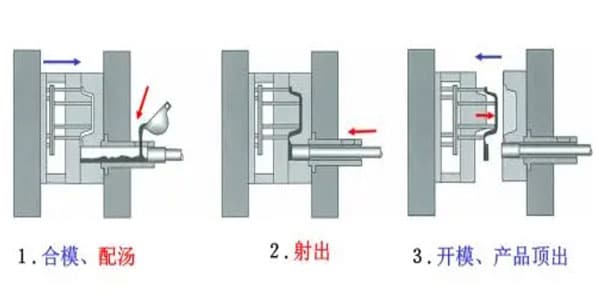Alcast Company Things To Know Before You Get This
Alcast Company Things To Know Before You Get This
Blog Article
The 3-Minute Rule for Alcast Company
Table of ContentsThe 30-Second Trick For Alcast CompanyOur Alcast Company StatementsAlcast Company - QuestionsGetting The Alcast Company To WorkGet This Report about Alcast CompanyNot known Details About Alcast Company
The subtle difference hinges on the chemical content. Chemical Comparison of Cast Light weight aluminum Alloys Silicon advertises castability by reducing the alloy's melting temperature and enhancing fluidity during spreading. It plays a critical duty in allowing detailed mold and mildews to be filled precisely. In addition, silicon adds to the alloy's stamina and use resistance, making it important in applications where longevity is critical, such as auto parts and engine components.It additionally enhances the machinability of the alloy, making it simpler to process right into ended up products. By doing this, iron adds to the overall workability of aluminum alloys. Copper boosts electric conductivity, making it useful in electric applications. It likewise improves corrosion resistance and contributes to the alloy's total toughness.
Manganese contributes to the strength of light weight aluminum alloys and boosts workability. Magnesium is a lightweight element that gives strength and effect resistance to light weight aluminum alloys.
How Alcast Company can Save You Time, Stress, and Money.
It permits the production of light-weight components with outstanding mechanical residential properties. Zinc enhances the castability of light weight aluminum alloys and aids control the solidification procedure during spreading. It boosts the alloy's toughness and firmness. It is often located in applications where detailed forms and fine details are required, such as decorative spreadings and particular vehicle components.

The primary thermal conductivity, tensile toughness, yield stamina, and elongation vary. Among the above alloys, A356 has the greatest thermal conductivity, and A380 and ADC12 have the least expensive.
The Best Strategy To Use For Alcast Company

In accuracy spreading, 6063 is well-suited for applications where elaborate geometries and premium surface area finishes are paramount. Examples consist of telecommunication units, where the alloy's remarkable formability permits streamlined and cosmetically pleasing styles while keeping structural stability. Similarly, in the Lights Solutions sector, precision-cast 6063 elements develop stylish and efficient lights components that need complex forms and great thermal efficiency.
It results in a finer surface coating and far better corrosion resistance in A360. Furthermore, the A360 exhibits remarkable prolongation, find here making it excellent for complex and thin-walled elements. In accuracy casting applications, A360 is appropriate for markets such as Consumer Electronic Devices, Telecommunication, and Power Tools. Its enhanced fluidness permits intricate, high-precision parts like mobile phone cases and interaction tool real estates.
The 10-Minute Rule for Alcast Company
Its distinct residential properties make A360 a valuable option for accuracy spreading in these sectors, enhancing product toughness and high quality. Aluminum alloy 380, or A380, is a commonly used spreading alloy with several unique characteristics. It provides outstanding castability, making it a suitable choice for accuracy casting. A380 displays good fluidity when molten, guaranteeing detailed and detailed molds are precisely duplicated.
In precision casting, aluminum 413 radiates in the Customer Electronic Devices and Power Equipment markets. It's commonly used to craft intricate parts like mobile phone real estates, video camera bodies, and power tool housings. Its accuracy is impressive, with limited tolerances up to 0.01 mm, making sure perfect product assembly. This alloy's remarkable rust resistance makes it an exceptional option for exterior applications, making certain durable, long lasting products in the discussed markets.
The Greatest Guide To Alcast Company
The light weight aluminum alloy you choose will substantially impact both the spreading process and the residential or commercial properties of the last item. Due to the fact that of this, you should make your choice very carefully and take an enlightened approach.
Establishing the most appropriate light weight aluminum alloy for your application will mean weighing a wide variety of characteristics. The very first group addresses alloy features that affect the manufacturing procedure.
The 7-Minute Rule for Alcast Company
The alloy you choose for die spreading directly influences a number of aspects of the casting procedure, like how very easy the alloy is to collaborate with and if it is susceptible to casting issues. Warm breaking, also referred to as solidification splitting, is a common die casting problem for light weight aluminum alloys that can result in interior or surface-level splits or cracks.
Particular light weight aluminum alloys are a lot more at risk to hot cracking than others, and your selection should consider this. It can damage both the actors and the die, so you need to look for alloys with high anti-soldering homes.
Rust resistance, which is already a notable characteristic of light weight aluminum, can differ considerably from alloy to alloy and is a vital characteristic to take into consideration relying on the ecological problems your product will certainly be subjected to (aluminum foundry). Put on resistance is one more property typically sought in aluminum items and can set apart some alloys
Report this page